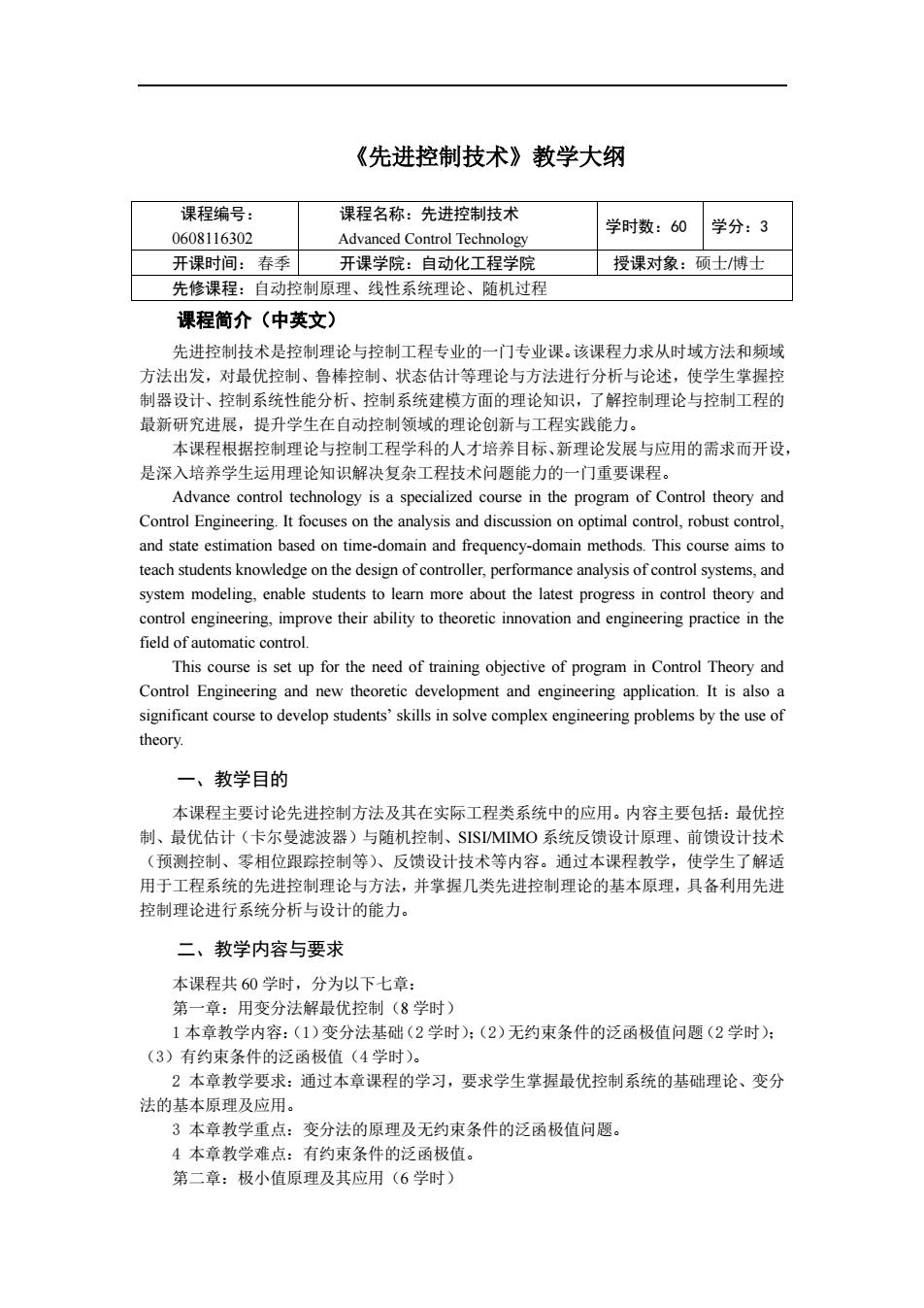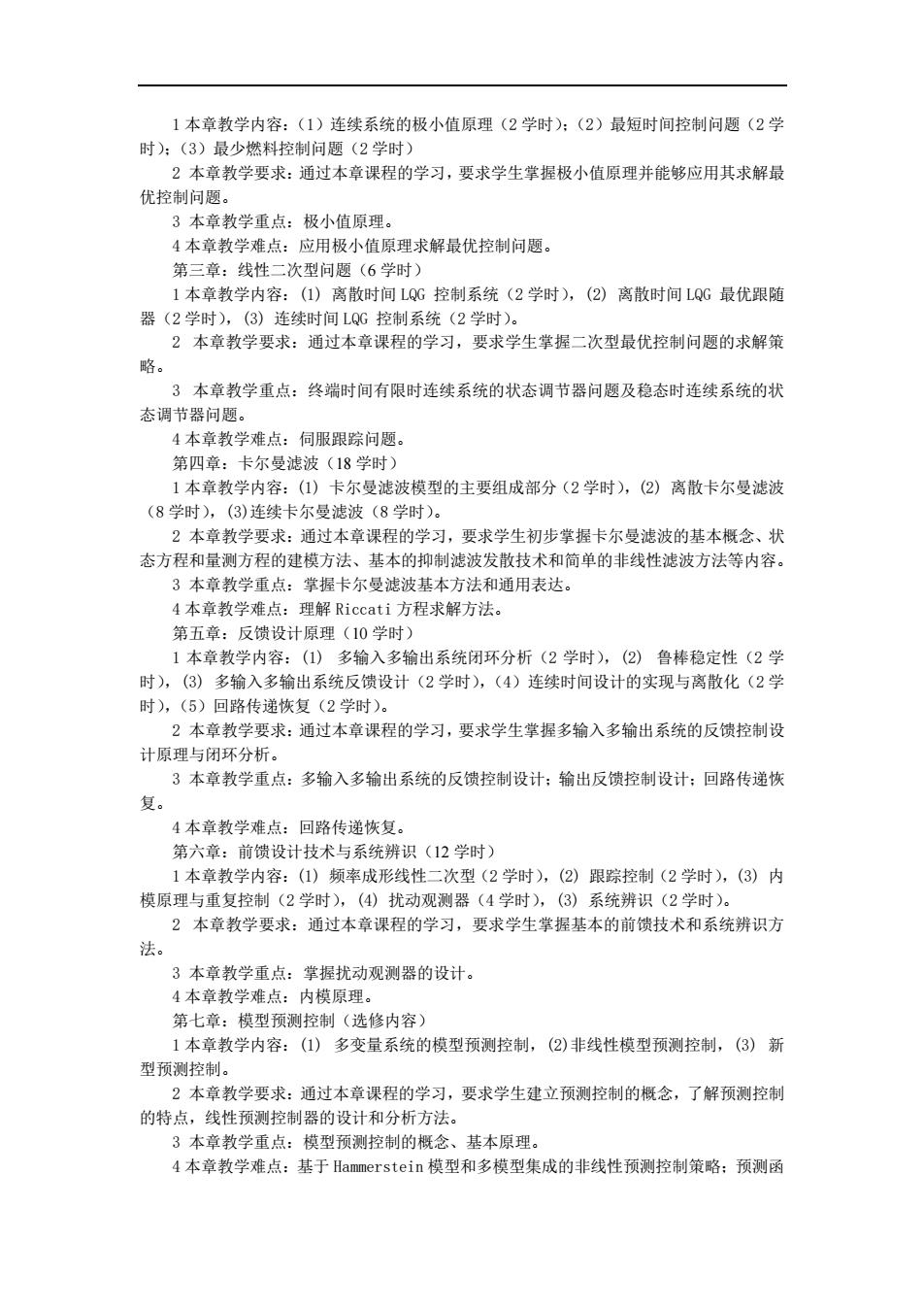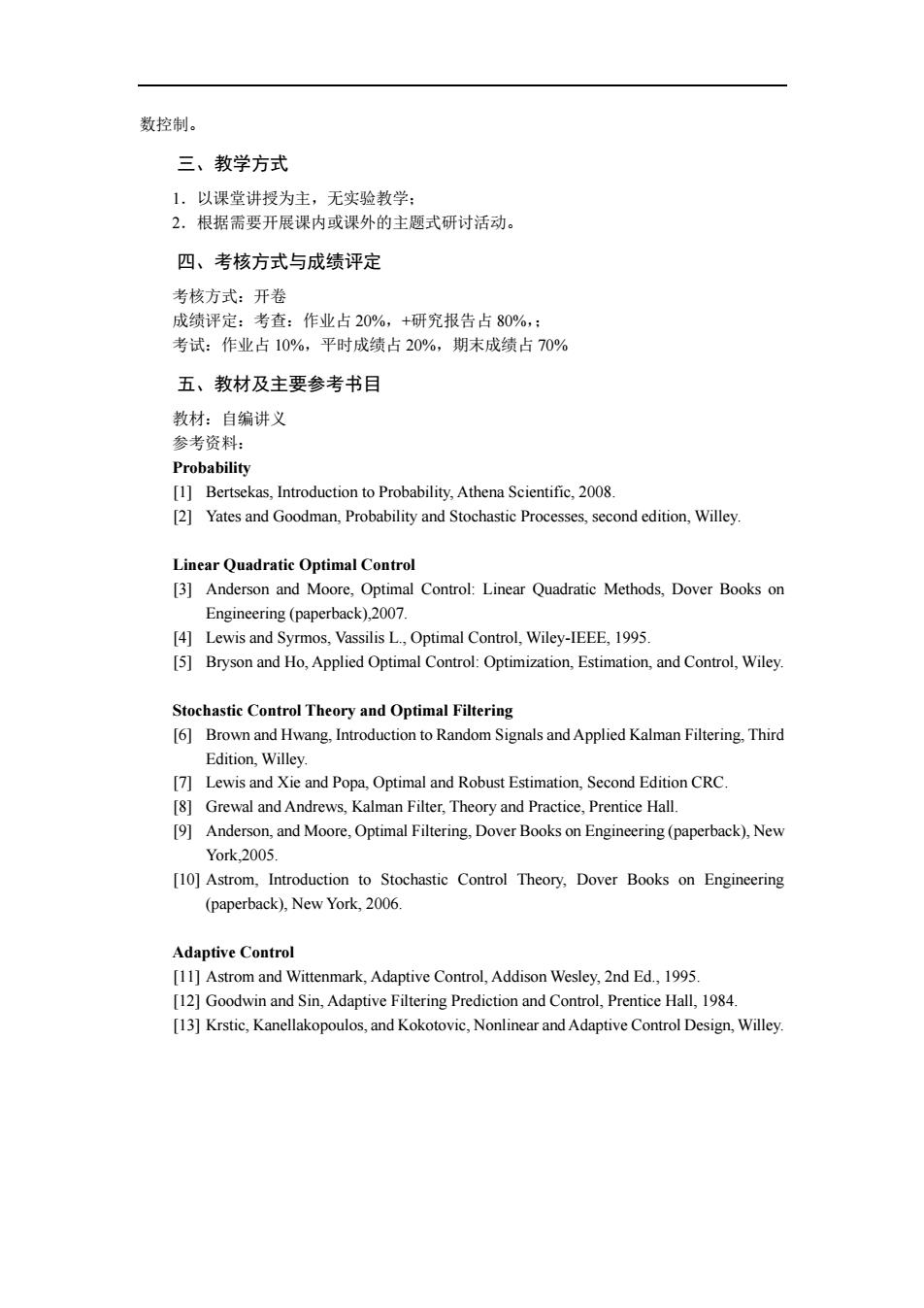
《先进控制技术》教学大纲 课程编号: 课程名称:先进控制技术 学时数:60 0608116302 学分:3 Advanced Control Technology 开课时间:春季 开课学院:自动化工程学院 授课对象:硕士博士 先修课程:自动控制原理、线性系统理论、随机过程 课程简介(中英文) 先进控制技术是控制理论与控制工程专业的一门专业课。该课程力求从时域方法和频域 方法出发,对最优控制、鲁棒控制、状态估计等理论与方法进行分析与论述,使学生掌握控 制器设计、控制系统性能分析、控制系统建模方面的理论知识,了解控制理论与控制工程的 最新研究进展,提升学生在自动控制领域的理论创新与工程实践能力。 本课程根据控制理论与控制工程学科的人才培养目标、新理论发展与应用的需求而开设, 是深入培养学生运用理论知识解决复杂工程技术问题能力的一门重要课程。 Advance control technology is a specialized course in the program of Control theory and Control Engineering.It focuses on the analysis and discussion on optimal control,robust control, and state estimation based on time-domain and frequency-domain methods.This course aims to teach students knowledge on the design of controller,performance analysis of control systems,and system modeling,enable students to learn more about the latest progress in control theory and control engineering,improve their ability to theoretic innovation and engineering practice in the field of automatic control. This course is set up for the need of training objective of program in Control Theory and Control Engineering and new theoretic development and engineering application.It is also a significant course to develop students'skills in solve complex engineering problems by the use of theory. 一、教学目的 本课程主要讨论先进控制方法及其在实际工程类系统中的应用。内容主要包括:最优控 制、最优估计(卡尔曼滤波器)与随机控制、SISI/MIMO系统反馈设计原理、前馈设计技术 (预测控制、零相位跟踪控制等)、反馈设计技术等内容。通过本课程教学,使学生了解适 用于工程系统的先进控制理论与方法,并掌握几类先进控制理论的基本原理,具备利用先进 控制理论进行系统分析与设计的能力。 二、教学内容与要求 本课程共60学时,分为以下七章: 第一章:用变分法解最优控制(8学时) 1本章教学内容:(1)变分法基础(2学时):(2)无约束条件的泛函极值问题(2学时): (3)有约束条件的泛函极值(4学时)。 2本章教学要求:通过本章课程的学习,要求学生掌握最优控制系统的基础理论、变分 法的基本原理及应用。 3本章教学重点:变分法的原理及无约束条件的泛函极值问题。 4本章教学难点:有约束条件的泛函极值。 第二章:极小值原理及其应用(6学时)
《先进控制技术》教学大纲 课程编号: 0608116302 课程名称:先进控制技术 Advanced Control Technology 学时数:60 学分:3 开课时间: 春季 开课学院:自动化工程学院 授课对象:硕士/博士 先修课程:自动控制原理、线性系统理论、随机过程 课程简介(中英文) 先进控制技术是控制理论与控制工程专业的一门专业课。该课程力求从时域方法和频域 方法出发,对最优控制、鲁棒控制、状态估计等理论与方法进行分析与论述,使学生掌握控 制器设计、控制系统性能分析、控制系统建模方面的理论知识,了解控制理论与控制工程的 最新研究进展,提升学生在自动控制领域的理论创新与工程实践能力。 本课程根据控制理论与控制工程学科的人才培养目标、新理论发展与应用的需求而开设, 是深入培养学生运用理论知识解决复杂工程技术问题能力的一门重要课程。 Advance control technology is a specialized course in the program of Control theory and Control Engineering. It focuses on the analysis and discussion on optimal control, robust control, and state estimation based on time-domain and frequency-domain methods. This course aims to teach students knowledge on the design of controller, performance analysis of control systems, and system modeling, enable students to learn more about the latest progress in control theory and control engineering, improve their ability to theoretic innovation and engineering practice in the field of automatic control. This course is set up for the need of training objective of program in Control Theory and Control Engineering and new theoretic development and engineering application. It is also a significant course to develop students’ skills in solve complex engineering problems by the use of theory. 一、教学目的 本课程主要讨论先进控制方法及其在实际工程类系统中的应用。内容主要包括:最优控 制、最优估计(卡尔曼滤波器)与随机控制、SISI/MIMO 系统反馈设计原理、前馈设计技术 (预测控制、零相位跟踪控制等)、反馈设计技术等内容。通过本课程教学,使学生了解适 用于工程系统的先进控制理论与方法,并掌握几类先进控制理论的基本原理,具备利用先进 控制理论进行系统分析与设计的能力。 二、教学内容与要求 本课程共 60 学时,分为以下七章: 第一章:用变分法解最优控制(8 学时) 1 本章教学内容:(1)变分法基础(2 学时);(2)无约束条件的泛函极值问题(2 学时); (3)有约束条件的泛函极值(4 学时)。 2 本章教学要求:通过本章课程的学习,要求学生掌握最优控制系统的基础理论、变分 法的基本原理及应用。 3 本章教学重点:变分法的原理及无约束条件的泛函极值问题。 4 本章教学难点:有约束条件的泛函极值。 第二章:极小值原理及其应用(6 学时)

1本章教学内容:(1)连续系统的极小值原理(2学时):(2)最短时间控制问题(2学 时):(3)最少燃料控制问题(2学时) 2本章教学要求:通过本章课程的学习,要求学生掌握极小值原理并能够应用其求解最 优控制问题。 3本章教学重点:极小值原理。 4本章教学难点:应用极小值原理求解最优控制问题。 第三章:线性二次型问题(6学时) 1本章教学内容:(1)离散时间LQG控制系统(2学时),(2)离散时间LQG最优跟随 器(2学时),(3)连续时间LQG控制系统(2学时)。 2本章教学要求:通过本章课程的学习,要求学生掌握二次型最优控制问题的求解策 略。 3本章教学重点:终端时间有限时连续系统的状态调节器问题及稳态时连续系统的状 态调节器问题。 4本章教学难点:伺服跟踪问题。 第四章:卡尔曼滤波(18学时) 1本章教学内容:(1)卡尔曼滤波模型的主要组成部分(2学时),(2)离散卡尔曼滤波 (8学时),(3)连续卡尔曼滤波(8学时)。 2本章教学要求:通过本章课程的学习,要求学生初步掌握卡尔曼滤波的基本概念、状 态方程和量测方程的建模方法、基本的抑制滤波发散技术和简单的非线性滤波方法等内容。 3本章教学重点:掌握卡尔曼滤波基本方法和通用表达。 4本章教学难点:理解Riccati方程求解方法。 第五章:反馈设计原理(10学时) 1本章教学内容:(1)多输入多输出系统闭环分析(2学时),(2)鲁棒稳定性(2学 时),(3)多输入多输出系统反馈设计(2学时),(4)连续时间设计的实现与离散化(2学 时),(5)回路传递恢复(2学时)。 2本章教学要求:通过本章课程的学习,要求学生掌握多输入多输出系统的反馈控制设 计原理与闭环分析。 3本章教学重点:多输入多输出系统的反馈控制设计:输出反馈控制设计:回路传递恢 复。 4本章教学难点:回路传递恢复。 第六章:前馈设计技术与系统辨识(12学时) 1本章教学内容:(1)频率成形线性二次型(2学时),(2)跟踪控制(2学时),(3)内 模原理与重复控制(2学时),(4)扰动观测器(4学时),(3)系统辨识(2学时)。 2本章教学要求:通过本章课程的学习,要求学生掌握基本的前馈技术和系统辨识方 法。 3本章教学重点:掌握扰动观测器的设计。 4本章教学难点:内模原理。 第七章:模型预测控制(选修内容) 1本章教学内容:(1)多变量系统的模型预测控制,(2)非线性模型预测控制,(3)新 型预测控制。 2本章教学要求:通过本章课程的学习,要求学生建立预测控制的概念,了解预测控制 的特点,线性预测控制器的设计和分析方法。 3本章教学重点:模型预测控制的概念、基本原理。 4本章教学难点:基于Hammerstein模型和多模型集成的非线性预测控制策略:预测函
1 本章教学内容:(1)连续系统的极小值原理(2 学时);(2)最短时间控制问题(2 学 时);(3)最少燃料控制问题(2 学时) 2 本章教学要求:通过本章课程的学习,要求学生掌握极小值原理并能够应用其求解最 优控制问题。 3 本章教学重点:极小值原理。 4 本章教学难点:应用极小值原理求解最优控制问题。 第三章:线性二次型问题(6 学时) 1 本章教学内容:(1) 离散时间 LQG 控制系统(2 学时),(2) 离散时间 LQG 最优跟随 器(2 学时),(3) 连续时间 LQG 控制系统(2 学时)。 2 本章教学要求:通过本章课程的学习,要求学生掌握二次型最优控制问题的求解策 略。 3 本章教学重点:终端时间有限时连续系统的状态调节器问题及稳态时连续系统的状 态调节器问题。 4 本章教学难点:伺服跟踪问题。 第四章:卡尔曼滤波(18 学时) 1 本章教学内容:(1) 卡尔曼滤波模型的主要组成部分(2 学时),(2) 离散卡尔曼滤波 (8 学时),(3)连续卡尔曼滤波(8 学时)。 2 本章教学要求:通过本章课程的学习,要求学生初步掌握卡尔曼滤波的基本概念、状 态方程和量测方程的建模方法、基本的抑制滤波发散技术和简单的非线性滤波方法等内容。 3 本章教学重点:掌握卡尔曼滤波基本方法和通用表达。 4 本章教学难点:理解 Riccati 方程求解方法。 第五章:反馈设计原理(10 学时) 1 本章教学内容:(1) 多输入多输出系统闭环分析(2 学时),(2) 鲁棒稳定性(2 学 时),(3) 多输入多输出系统反馈设计(2 学时),(4)连续时间设计的实现与离散化(2 学 时),(5)回路传递恢复(2 学时)。 2 本章教学要求:通过本章课程的学习,要求学生掌握多输入多输出系统的反馈控制设 计原理与闭环分析。 3 本章教学重点:多输入多输出系统的反馈控制设计;输出反馈控制设计;回路传递恢 复。 4 本章教学难点:回路传递恢复。 第六章:前馈设计技术与系统辨识(12 学时) 1 本章教学内容:(1) 频率成形线性二次型(2 学时),(2) 跟踪控制(2 学时),(3) 内 模原理与重复控制(2 学时),(4) 扰动观测器(4 学时),(3) 系统辨识(2 学时)。 2 本章教学要求:通过本章课程的学习,要求学生掌握基本的前馈技术和系统辨识方 法。 3 本章教学重点:掌握扰动观测器的设计。 4 本章教学难点:内模原理。 第七章:模型预测控制(选修内容) 1 本章教学内容:(1) 多变量系统的模型预测控制,(2)非线性模型预测控制,(3) 新 型预测控制。 2 本章教学要求:通过本章课程的学习,要求学生建立预测控制的概念,了解预测控制 的特点,线性预测控制器的设计和分析方法。 3 本章教学重点:模型预测控制的概念、基本原理。 4 本章教学难点:基于 Hammerstein 模型和多模型集成的非线性预测控制策略;预测函

数控制。 三、教学方式 1.以课堂讲授为主,无实验教学: 2.根据需要开展课内或课外的主题式研讨活动。 四、考核方式与成绩评定 考核方式:开卷 成绩评定:考查:作业占20%,+研究报告占80%,: 考试:作业占10%,平时成绩占20%,期末成绩占70% 五、教材及主要参考书目 教材:自编讲义 参考资料: Probability [1]Bertsekas,Introduction to Probability,Athena Scientific,2008. [2]Yates and Goodman,Probability and Stochastic Processes,second edition,Willey. Linear Quadratic Optimal Control [3]Anderson and Moore,Optimal Control:Linear Quadratic Methods,Dover Books on Engineering(paperback),2007. [4]Lewis and Syrmos,Vassilis L.,Optimal Control,Wiley-IEEE,1995. [5]Bryson and Ho,Applied Optimal Control:Optimization,Estimation,and Control,Wiley. Stochastic Control Theory and Optimal Filtering [6]Brown and Hwang,Introduction to Random Signals and Applied Kalman Filtering,Third Edition,Willey. [7]Lewis and Xie and Popa,Optimal and Robust Estimation,Second Edition CRC. [8]Grewal and Andrews,Kalman Filter,Theory and Practice,Prentice Hall. [9]Anderson,and Moore,Optimal Filtering,Dover Books on Engineering(paperback),New York.2005. [10]Astrom,Introduction to Stochastic Control Theory,Dover Books on Engineering (paperback),New York,2006. Adaptive Control [11]Astrom and Wittenmark,Adaptive Control,Addison Wesley,2nd Ed.,1995. [12]Goodwin and Sin,Adaptive Filtering Prediction and Control,Prentice Hall,1984. [13]Krstic,Kanellakopoulos,and Kokotovic,Nonlinear and Adaptive Control Design,Willey
数控制。 三、教学方式 1.以课堂讲授为主,无实验教学; 2.根据需要开展课内或课外的主题式研讨活动。 四、考核方式与成绩评定 考核方式:开卷 成绩评定:考查:作业占 20%,+研究报告占 80%,; 考试:作业占 10%,平时成绩占 20%,期末成绩占 70% 五、教材及主要参考书目 教材:自编讲义 参考资料: Probability [1] Bertsekas, Introduction to Probability, Athena Scientific, 2008. [2] Yates and Goodman, Probability and Stochastic Processes, second edition, Willey. Linear Quadratic Optimal Control [3] Anderson and Moore, Optimal Control: Linear Quadratic Methods, Dover Books on Engineering (paperback),2007. [4] Lewis and Syrmos, Vassilis L., Optimal Control, Wiley-IEEE, 1995. [5] Bryson and Ho, Applied Optimal Control: Optimization, Estimation, and Control, Wiley. Stochastic Control Theory and Optimal Filtering [6] Brown and Hwang, Introduction to Random Signals and Applied Kalman Filtering, Third Edition, Willey. [7] Lewis and Xie and Popa, Optimal and Robust Estimation, Second Edition CRC. [8] Grewal and Andrews, Kalman Filter, Theory and Practice, Prentice Hall. [9] Anderson, and Moore, Optimal Filtering, Dover Books on Engineering (paperback), New York,2005. [10] Astrom, Introduction to Stochastic Control Theory, Dover Books on Engineering (paperback), New York, 2006. Adaptive Control [11] Astrom and Wittenmark, Adaptive Control, Addison Wesley, 2nd Ed., 1995. [12] Goodwin and Sin, Adaptive Filtering Prediction and Control, Prentice Hall, 1984. [13] Krstic, Kanellakopoulos, and Kokotovic, Nonlinear and Adaptive Control Design, Willey